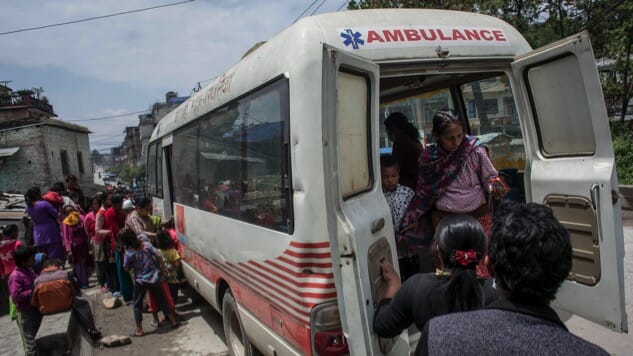
The Trump administration’s decision to cut off vital funding to the United Nations Population Fund (UNFPA) will significantly reduce available resources for reproductive health care in some of the world’s most vulnerable communities. Often, when we in the polarized west hear the words “reproductive health,” our political minds jump to “abortion” and our strident opinions on it. But reproductive health care is so, so much more than abortion.
For the record, UNFPA does not seek to influence a sovereign country’s legislation on abortion. UNFPA asserts that, “where abortion is legal, national health systems should make it safe and accessible.” It does not support coercive or forced abortion, or abortion based on sex-selection. For more information, please see UNFPA’s FAQs.
The programs funded by UNFPA cover things we take for granted, like basic equipment to ensure safer births and maternal health care. The politicization of these essential services to score crude and quickly forgotten points is shocking, dispiriting and, yes, deplorable. It targets those who most need support from the international community.
My first real job after university was working in reproductive health in rural Nepal. I saw first hand the incredible work of UNFPA, helping marginalized women and families with scant access to health services. This was over ten years ago now, so while the circumstances of village families in Nepal may have changed, I’m sure the courage and care of UNFPA staff has not.
In the dying days of Nepal’s ten-year Maoist insurgency, UNFPA and other aid organizations were finally able to send staff back into remote regions to reestablish health programs that had been too dangerous to run during the conflict.
One initiative by UNFPA was to hold reproductive health camps, where women from all over the area could come to access free services. Many of the women were elderly, or at least old before their time. They trekked for hours, sometimes days, to reach the camps, and many were looking for help with their prolapsed uterus.
Nepal is mountainous. Rural life is hard. Women have many children. They also carry huge physical weights. Rocks, for example, could be carried on their backs, supported by a piece of rope across the bearer’s forehead for hours up steep trails. All of this causes strain to the muscles supporting the uterus, and sometimes, it drops out.
It smells. It’s uncomfortable. It causes shame and social isolation. But UNFPA helps.
HIV/AIDS was a hidden, secret scourge in southern Nepal. Many young men desperate for money to support their families would cross the border into India for months if not years to earn. They visited brothels while they were there, and brought sexual infections back home with them.
Young Nepali village women crossed the border seeking restaurant or maid work; some of them ended up in the brothels too, unwillingly.
Village health care practitioners were unable to manage the effects of HIV. They had limited education, some nurses told us that drying bedding in the sun would effectively combat the virus. They didn’t have the facilities to test for HIV, let alone the drugs to manage it. Some health workers said that even if they could test for HIV, they wouldn’t tell people the results, because they didn’t have the drugs to help them. What resources their developing government could get to them was often ransacked by the rebels, and they would have had to travel for days across insecure territory to get additional supplies. This was true for basic bandages and birthing kits, let alone more specialised equipment or medication. When people died of suspected HIV complications, the community told themselves they had died of cancer.
It was bleak. It was hidden. It frightened the community. But UNFPA helped by providing education and health care support.
In contexts such as these, where husbands can be away for long periods and can bring back sexually transmitted infections, condoms are not just about birth control. They can literally save lives. During the days of the Maoist insurgency, education on condoms was limited, because travel was limited. Condoms themselves made it to villages, however, and found all sorts of interesting secondary uses. Children inflated them for water bombs or balloons. They were used as makeshift rubber gloves. They were also used the traditional way, and then, because they were in short supply, washed, hung up to dry and used again. And again. And again.
But I won’t rely on the argument that we need to support condom provision because they help to prevent the transmission of HIV and other sexually transmitted infections. Birth control and choice of method is also vital. Families, especially those with limited resources to care for or educate their children, need to be able to plan how many they have and when. UNFPA supports education on contraception and spacing methods.
Some traditions in Nepal stipulate that women must be segregated while menstruating. Depending on the family, they may need to sleep outside the house during this period—in the shed, for example—and refrain from touching the food or drink of others. To add a more shallow western perspective, my yoga teacher refused to instruct me during this time. After giving birth, women may be confined for a month, sometimes in appalling conditions.
All of this requires culturally sensitive, appropriate education. Rural Nepal can be very conservative and traditional. You can’t go into villages chucking condoms everywhere, preaching the benefits of a small family and ridiculing their cultural values. It takes time to understand perspectives, to gain trust.
It requires local people working with the community to find solutions that work for them. It requires international expertise and knowledge transfer. It requires time. Crucially, it requires funding. Because UNFPA helps families when their own governments can’t yet, and all people are worthy of dignity.